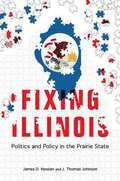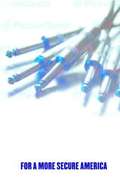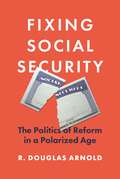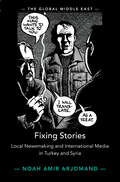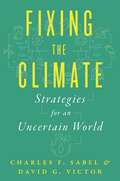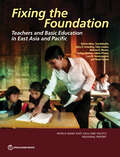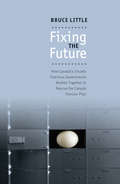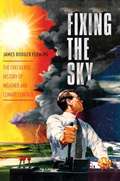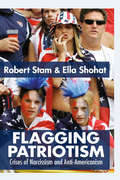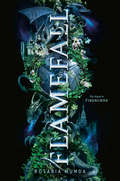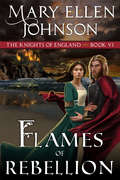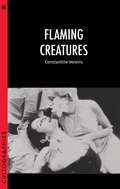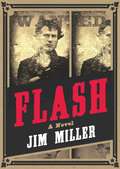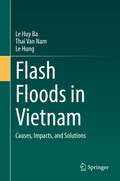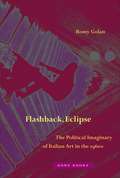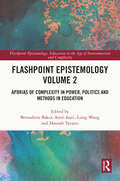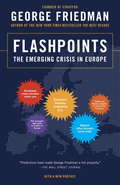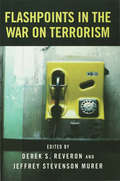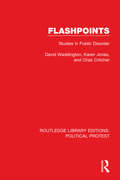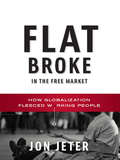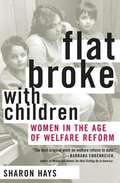- Table View
- List View
Fixing Illinois: Politics and Policy in the Prairie State
by James D. Nowlan J. Thomas JohnsonPersistent problems have left Illinois the butt of jokes and threatened it with fiscal catastrophe. In Fixing Illinois, James D. Nowlan and J. Thomas Johnson use their four decades of experience as public servants, Springfield veterans, and government observers to present a comprehensive program of almost one hundred specific policy ideas aimed at rescuing the state from its long list of problems. Nowlan and Johnson start with the history of how one of the most prosperous states of the 1950s became a present-day mess riven by debt and discord and increasingly abandoned by both businesses and citizens. Among their more than ninety proposals to restore Illinois to greatness: * An overhaul of state pension systems that includes more reasonable benefits and lengthening of the retirement age, among other changes; * Reducing one of the nation's highest corporate tax rates to attract business; * Medicare reform through an insurance voucher program; * Demanding that schools raise expectations for success, particularly in rural and impoverished urban areas; * A new approach to higher education that includes a market-driven system that puts funds in the hands of students rather than institutions; * Broadening of the tax base to include services and reduction in rates; * The creation of a long-term plan to maintain the state's five-star transportation infrastructure; * Raising funds with capital construction bonds to update and integrate the antiquated information systems used by state agencies; * Uprooting the state's entrenched culture of corruption via public financing of elections, redistricting reform, and revolving door prohibitions for lawmakers. Pointed, honest, and pragmatic, Fixing Illinois is a plan for effective and honest government that seeks an even nobler end: restoring our faith in Illinois's institutions and reviving a sense of citizenship and state pride.
Fixing Intelligence: For a More Secure America
by William E. OdomBasing his text in large part on a study he authored in 1997, published by the National Institute of Public Policy, Odom (a senior fellow at the Hudson Institute and a former director of the National Security Agency) considers recommendations for the reform of American intelligence activities and organization. Among his suggestions are granting more intelligence oversight authority over all the diverse intelligence organizations to the Director of Central Intelligence; eliminating CIA obstructionism in expanding military intelligence capabilities; recognizing the need to have national managers for the separate disciplines of signals, imagery, and human intelligence; and taking counterintelligence activities out from under the provenance of the law enforcement agencies. Annotation ©2004 Book News, Inc. , Portland, OR (booknews. com)
Fixing Medical Prices
by Miriam J. LaugesenMiriam Laugesen goes to the heart of U.S. medical pricing: to a largely unknown committee of organizations affiliated with the American Medical Association. Medicare's ready acceptance of this committee's advisory recommendations sets off a chain reaction across the American health care system, leading to high--and disproportionate--rate setting.
Fixing Social Security: The Politics of Reform in a Polarized Age
by R. Douglas ArnoldHow Social Security has shaped American politics—and why it faces insolvencySince its establishment, Social Security has become the financial linchpin of American retirement. Yet demographic trends—longer lifespans and declining birthrates—mean that this popular program now pays more in benefits than it collects in revenue. Without reforms, 83 million Americans will face an immediate benefit cut of 20 percent in 2034. How did we get here and what is the solution? In Fixing Social Security, R. Douglas Arnold explores the historical role that Social Security has played in American politics, why Congress has done nothing to fix its insolvency problem for three decades, and what legislators can do to save it.What options do legislators have as the program nears the precipice? They can raise taxes, as they did in 1977, cut benefits, as they did in 1983, or reinvent the program, as they attempted in 2005. Unfortunately, every option would impose costs, and legislators are reluctant to act, fearing electoral retribution. Arnold investigates why politicians designed the system as they did and how between 1935 and 1983 they allocated—and reallocated—costs and benefits among workers, employers, and beneficiaries. He also examines public support for the program, and why Democratic and Republican representatives, once political allies in expanding Social Security, have become so deeply polarized about fixing it.As Social Security edges closer to crisis, Fixing Social Security offers a comprehensive analysis of the political fault lines and a fresh look at what can be done—before it is too late.
Fixing Stories: Local Newsmaking and International Media in Turkey and Syria (The Global Middle East)
by Noah Amir ArjomandNews 'fixers' are translators and guides who assist foreign journalists. Sometimes key contributors to bold, original reporting and other times key facilitators of homogeneity and groupthink in the news media, they play the difficult but powerful role of broker between worlds, shaping the creation of knowledge from behind the scenes. In Fixing Stories, Noah Amir Arjomand reflects on the nature of news production and cross-cultural mediation. Based on human stories drawn from three years of field research in Turkey, this book unfolds as a series of narratives of fixers' career trajectories during a period when the international media spotlight shone on Turkey and Syria. From the Syrian Civil War, Gezi Park protest movement, rise of authoritarianism in Turkey and of ISIS in Syria, to the rekindling of conflict in both countries' Kurdish regions and Turkey's 2016 coup attempt, Arjomand brings to light vivid personal accounts and insider perspectives on world-shaking events alongside analysis of the role fixers have played in bringing news of Turkey and Syria to international audiences.
Fixing the Climate: Strategies for an Uncertain World
by David G. Victor Charles F. SabelSolving the global climate crisis through local partnerships and experimentationGlobal climate diplomacy—from the Kyoto Protocol to the Paris Agreement—is not working. Despite decades of sustained negotiations by world leaders, the climate crisis continues to worsen. The solution is within our grasp—but we will not achieve it through top-down global treaties or grand bargains among nations.Charles Sabel and David Victor explain why the profound transformations needed for deep cuts in emissions must arise locally, with government and business working together to experiment with new technologies, quickly learn the best solutions, and spread that information globally. Sabel and Victor show how some of the most iconic successes in environmental policy were products of this experimentalist approach to problem solving, such as the Montreal Protocol on the ozone layer, the rise of electric vehicles, and Europe’s success in controlling water pollution. They argue that the Paris Agreement is at best an umbrella under which local experimentation can push the technological frontier and help societies around the world learn how to deploy the technologies and policies needed to tackle this daunting global problem.A visionary book that fundamentally reorients our thinking about the climate crisis, Fixing the Climate is a road map to institutional design that can finally lead to self-sustaining reductions in emissions that years of global diplomacy have failed to deliver.
Fixing the Facts: National Security and the Politics of Intelligence
by Joshua RovnerWhat is the role of intelligence agencies in strategy and policy? How do policymakers use (or misuse) intelligence estimates? When do intelligence-policy relations work best? How do intelligence-policy failures influence threat assessment, military strategy, and foreign policy? These questions are at the heart of recent national security controversies, including the 9/11 attacks and the war in Iraq. In both cases the relationship between intelligence and policy broke down-with disastrous consequences. In Fixing the Facts, Joshua Rovner explores the complex interaction between intelligence and policy and shines a spotlight on the problem of politicization. Major episodes in the history of American foreign policy have been closely tied to the manipulation of intelligence estimates. Rovner describes how the Johnson administration dealt with the intelligence community during the Vietnam War; how President Nixon and President Ford politicized estimates on the Soviet Union; and how pressure from the George W. Bush administration contributed to flawed intelligence on Iraq. He also compares the U.S. case with the British experience between 1998 and 2003, and demonstrates that high-profile government inquiries in both countries were fundamentally wrong about what happened before the war.
Fixing the Foundation: Teachers and Basic Education in East Asia and Pacific (World Bank East Asia and Pacific Regional Report)
by Aaditya Mattoo Tara Beteille Rythia Afkar Mary Breeding Linden Tobias Pfutze Lars Sondergaard Noah YarrowCountries in middle-income East Asia and the Pacific were already experiencing serious learning deficits prior to the COVID-19 pandemic. COVID-related school disruptions have only made things worse. Learning poverty -- defined as the percentage of 10-year-olds who cannot read and understand an age-appropriate text -- is as high as 90 percent in several countries. Several large Southeast Asian countries consistently perform well below expectations on adolescent learning assessments. This report examines key factors affecting student learning in the region, with emphasis on the central role of teachers and teaching quality. It also analyzes the role education technologies, which came into widespread use during the pandemic, and examines the political economy of education reform. The report presents recommendations on how countries can strengthen teaching to improve learning and, in doing so, can enhance productivity, growth, and future development in the region.
Fixing the Future: How Canada's Usually Fractious Governments Worked Together to Rescue the Canada Pension Plan
by Bruce LittleIn 1993, most Canadians believed that big government deficits were permanent and that the Canada Pension Plan (CPP) was in such deep trouble that younger Canadians would never collect a retirement pension. They believed too that Canada's politicians were incapable of dealing with either problem. Yet by 1998, both were essentially solved.<P><P> While the deficit battles have been recounted many times, the story of the reform that rescued the CPP has gone almost entirely untold. In Fixing the Future, Bruce Little explains the CPP overhaul and shows why it stands as one of Canada's most significant public policy success stories, in part because it demanded an almost unparalleled degree of federal-provincial co-operation. Providing an overview of the CPP's entire history from its beginning in 1965, Little pulls together published, and new unpublished, material relating to the CPP reform, and interviews over fifty politicians, government officials, and others who were deeply involved in the reforms for their recollections, insights, and observations.<P> A superbly told history of one of Canada's most important public policy issues, Fixing the Future will be of interest to political scientists, historians, economists, and anyone concerned about their retirement.
Fixing the Sky: The Checkered History of Weather and Climate Control (Columbia Studies in International and Global History)
by James FlemingAs alarm over global warming spreads, a radical idea is gaining momentum. Forget cuts in greenhouse gas emissions, some scientists argue. Instead, bounce sunlight back into space by pumping reflective nanoparticles into the atmosphere. Launch mirrors into orbit around the Earth. Make clouds thicker and brighter to create a "planetary thermostat."These ideas might sound like science fiction, but in fact they are part of a very old story. For more than a century, scientists, soldiers, and charlatans have tried to manipulate weather and climate, and like them, today's climate engineers wildly exaggerate what is possible. Scarcely considering the political, military, and ethical implications of managing the world's climate, these individuals hatch schemes with potential consequences that far outweigh anything their predecessors might have faced.Showing what can happen when fixing the sky becomes a dangerous experiment in pseudoscience, James Rodger Fleming traces the tragicomic history of the rainmakers, rain fakers, weather warriors, and climate engineers who have been both full of ideas and full of themselves. Weaving together stories from elite science, cutting-edge technology, and popular culture, Fleming examines issues of health and navigation in the 1830s, drought in the 1890s, aircraft safety in the 1930s, and world conflict since the 1940s. Killer hurricanes, ozone depletion, and global warming fuel the fantasies of today. Based on archival and primary research, Fleming's original story speaks to anyone who has a stake in sustaining the planet.
Flag, Nation and Symbolism in Europe and America
by Thomas Hylland Eriksen Richard JenkinsAlthough the symbolic and political importance of flags has often been mentioned by scholars of nationalism, there are few in-depth studies of the significance of flags for national identities. This multi-disciplinary collection offers case studies and comparisons of flag history, uses and controversies. This book brings together a dozen scholars, from varying national and disciplinary backgrounds, to offers a cluster of close readings of flags in their social contexts, mostly contemporary, but also historical. Case studies from Denmark, England, Northern Ireland, Norway, Sweden, and the United States explore ways in which flags are contested, stir up powerful emotions, can be commercialised in some contexts but not in others, serve as quasi-religious symbols, and as physical boundary markers; how the same flag can be solemn and formal in one setting, but stand for domestic bliss and informal cultural intimacy in another.
Flagging Patriotism: Crises of Narcissism and Anti-Americanism
by Ella Shohat Robert StamThe question "Why do they hate us?" is one of the most oft-cited puzzles of contemporary American affairs, yet it’s not clear to whom "they" or "us" refers, nor even what "hate" means. In this bold new work, Ella Shohat and Robert Stam take apart the "hate discourse" of right-wing politics, placing it in an international context. How, for example, do other nations love themselves, and how is that love connected to their attitudes toward America? Is love of country "monogamous" or can one love many countries? When can a country’s self-love be a symptom of self-hatred? Drawing upon their extensive experience with South American, European, and Middle Eastern societies, the authors have written a long engagement with a problem that refuses to go away. Flagging Patriotism considers these complex features of "being patriotic," and in so doing insists that the idea of patriotism, instead of being rejected or embraced, be accorded the complex identity it possesses.
Flamefall (THE AURELIAN CYCLE #2)
by Rosaria MundaRevolutionary flames ignite around Annie, Lee, and a brand new character in the follow-up to FIREBORNE.After fleeing the revolution and settling into the craggy cliffs of New Pythos, the dragonlords are eager to punish their usurpers and reclaim their city. Their first order of business was destroying the Callipolan food supply. Now they're coming for the dragonriders.Annie is Callipolis's new Firstrider, charged with leading the war against New Pythos. But with unrest at home, enforcing the government's rationing program risks turning her into public enemy number one.Lee struggles to find his place after killing kin for a leader who betrayed him. He can support Annie and the other Guardians . . . or join the rebels who look to topple the new regime.Griff, a lowborn dragonrider who serves New Pythos, knows he has no future. And now that Julia Stormscourge is no longer there to protect him, he is called on to sacrifice everything for the lords that oppress his people--or to forge a new path with the Callipolan Firstrider seeking his help.With famine tearing Callipolis apart and the Pythians determined to take back what they lost, it will be up to Annie, Lee, and Griff to decide who--and what--to fight for.
Flames of Discontent: The 1916 Minnesota Iron Ore Strike
by Gary KaunonenOn June 2, 1916, forty mostly immigrant mineworkers at the St. James Mine in Aurora, Minnesota, walked off the job. This seemingly small labor disturbance would mushroom into one of the region&’s, if not the nation&’s, most contentious and significant battles between organized labor and management in the early twentieth century. Flames of Discontent tells the story of this pivotal moment and what it meant for workers and immigrants, mining and labor relations in Minnesota and beyond.Drawing on previously untapped accounts from immigrant press newspapers, company letters, personal journals, and oral histories, historian Gary Kaunonen gives voice to the strike&’s organizers and working-class participants. In depth and in dramatic detail, his book describes the events leading up to the strike, and the violence that made it one of the most contentious in Minnesota history. Against the background of the physical and cultural landscape of Minnesota&’s Iron Range, Kaunonen&’s history brings the lives of working-class Finnish immigrants into sharp relief, documenting the conditions and circumstances behind the emergence of leftist politics and union organization in their ranks. At the same time, it shows how the region&’s South Slavic immigrants went from &“scabs&” during a 1907 strike to full-fledged striking members of the labor revolt of 1916. A look at the media of the time reveals how the three main contenders for working-class allegiances—mine owners, Progressive reformers, and a revolutionary union—communicated with their mostly immigrant audience. Meanwhile, documents from mining company officials provide a strong argument for corruption reaching as far as the state&’s then governor, Joseph A. A. Burnquist, whose strike-busting was undertaken in the interests of billion dollar corporations.Ultimately, anti-syndicalist laws were put in place to thwart the growing influence of organizations that sought to represent immigrant workers. Flames of Discontent raises the voices of those workers, and of history, against an injustice that reverberates to this day.
Flames of Rebellion: A Medieval Romance (The Knights of England Series #6)
by Mary Ellen JohnsonCivil War Once Again Threatens England in the Medieval Historical, THE FLAMES OF REBELLION, by Mary Ellen Johnson1397 to 1403. England, Tintagel, London, Shrewsbury, Conway Castle, Tower of London, Cumbria, Westminster Abbey, Wales and ScotlandIn the fourteenth century’s waning days, the tyrannical Richard II is knocked from his throne, and Henry IV is crowned, despite a shaky claim to the throne.Knight Matthew Hart, now in his sixties, believes he can retire to a quiet life in the wilds of Cumbria while Lancelot and Janey’s love remains more the stuff of Romances than reality.Yet, all too soon, England’s lords grow restless, betrayal is in the air, and Matthew and his family must again ride into battle on behalf of their endangered king.The fates of all the characters who grace the Knights of England series, spanning a century—including some of the most vivid battles, events and historical characters in medieval history—are resolved.Publisher’s Note: Readers with a passion for history will appreciate the author’s penchant for detail and accuracy. In keeping with the era, this story contains scenes of brutality which are true to the time and man’s timeless inhumanity. There are a limited number of sexual scenes and NO use of modern vulgarity.From the Author: There is nothing new under the sun. If we seek to understand today’s events, history will always provide the answer. By 1398 the megalomaniacal Richard II had consolidated his power, executed or banished all his enemies and destroyed all those who might speak out in opposition to him. Two years later Richard was deposed, thrown into a dungeon in Pontefract Castle and starved to death. Lessons: We can never predict the future; actions always have unintended consequences; we sow the seeds of our own destruction and payback’s a bitch!THE KNIGHTS OF ENGLAND, in series orderThe Lion and the LeopardA Knight There WasWithin A Forest DarkA Child Upon The ThroneLords Among the RuinsThe Flames of Rebellion
Flaming Creatures (Cultographies)
by Constantine VerevisBanned soon after its first midnight screenings, the prints seized and the organizers arrested, Jack Smith’s incendiary Flaming Creatures (1963) quickly became a cause célèbre of the New York underground. Championed and defended by Jonas Mekas and Susan Sontag, among others, the film wildly and gleefully transgresses nearly every norm of Hollywood morality and aesthetics. In a surreal and visually dense series of episodes, the titular “creatures” reenact scenes drawn from the collective cinematic unconscious, playing on mainstream film culture’s moral code in a way that is at once a love letter to classical Hollywood and a searing send-up of its absurdities.Tracing the film’s production and reception history, Constantine Verevis argues that it embodies a unique type of cinematic rewriting, one that combines Smith’s multifaceted artistic work with exotic fragments drawn from the cinematic past. This study of Smith’s magnum opus explores its status as a cult film that appropriates the visual texture, erotic nuance, and overt fabrication of old Hollywood exoticism.
Flash
by Jim Miller"'This remarkable novel is nothing less than a secret history of southern California-a radical past that might yet redeem our future."-Mike Davis, author of City of QuartzA chance encounter with a faded "Wanted!" poster in a San Diego library sends journalist Jack Wilson on a wild adventure through southern California's radical past. As Jack searches for the truth about I.W.W. outlaw Bobby Flash, he uncovers a hidden history of real-life revolutionaries . . . and learns a powerful lesson about the importance of family in the process.Jim Miller is a labor educator and activist in San Diego, California.
Flash Floods in Vietnam: Causes, Impacts, and Solutions
by Le Huy Ba Thai Van Nam Le HungThis book discusses the threats and impacts of flash floods in Vietnam on environmental, human, and socio-economic resources, and covers monitoring, forecasting, warning, urgent action plans, and prevention solutions. While the work focuses on cases in Vietnam, it is applicable to many regions in the world that experience flash flooding as a common occurrence. Through data collection, field surveys, and investigational statistics from a specialized group of authors, the book provides comprehensive background knowledge on flash floods, and a flash flood hazard map using remote sensing and GIS techniques that can be used to assess the likelihood and potential impacts of flash floods before vulnerable areas and populations can be threatened. The intended audience of this manuscript is people interested in the fields of weather, environment, and natural disasters. It will serve as a reference for environmental managers, administrators of disaster planning, and extreme weather scientists.
Flashback, Eclipse: The Political Imaginary of Italian Art in the 1960s
by Romy GolanFrom a leading art historian, a provocative exploration of the intersection of art, politics, and historical memory in 1960s Italy.Flashback, Eclipse is a groundbreaking study of 1960s Italian art and its troubled but also resourceful relation to the history and politics of the first part of the twentieth century and the aftermath of World War II. Most analyses have treated the 1960s in Italy as the decade of “presentism” par excellence, a political decade but one liberated from history. Romy Golan, however, makes the counterargument that 1960s Italian artists did not forget Italian and European history but rather reimagined it in oblique form. Her book identifies and explores this imaginary through two forms of nonlinear and decidedly nonpresentist forms of temporality—the flashback and the eclipse. In view of the photographic and filmic nature of these two concepts, the book’s analysis is largely mediated by black-and-white images culled from art, design, and architecture magazines, photo books, film stills, and exhibition documentation.The book begins in Turin with Michelangelo Pistoletto’s Mirror Paintings; moves on to Campo urbano, a one-day event in the city of Como; and ends with the Vitalità del Negativo exhibition in Rome. What is being recalled and at other moments occluded are not only episodes of Italian nationalism and Fascism but also various liberatory moments of political and cultural resistance. The book’s main protagonists are, in order of appearance, artists Michelangelo Pistoletto and Giosetta Fioroni, photographer Ugo Mulas, Ettore Sottsass (as critic rather than designer), graphic designer Bruno Munari, curators Luciano Caramel and Achille Bonito Oliva, architect Piero Sartogo, Carla Lonzi (as artist as much as critic), filmmakers Michelangelo Antonioni and Bernardo Bertolucci, and, in flashback among the departed, painter Felice Casorati, writer Massimo Bontempelli, art historian Aby Warburg, architect Giuseppe Terragni, and Renaissance friar-philosopher-mathematician Giordano Bruno (as patron saint of the sixty-eighters).
Flashpoint Epistemology Volume 2: Aporias of Complexity in Power, Politics and Methods in Education (Flashpoint Epistemology)
by Liang Wang Bernadette Baker Antti Saari Hannah TavaresThe 21st century is steeped in claims to interconnection, technological innovation, and new affective intensities amid challenges to the primacy and centrality of "the human". Flashpoint epistemology attends to the lived difficulties that arise in teaching, policymaking, curriculum, and research among continuous practices of differentiation, and for which there is no pre-existing template for judgment, resolution, or action. Flashpoint Epistemology Volume 2 brings creative sociopolitical research perspectives to flashpoints that emerge amid appeals to globalization, synoptic policy approaches, and new technologies – however defined. The chapters challenge prevailing notions of distance and difference, comparative philosophy, worlding practices, and contact zones. In the remaking of subjects, the unhoming of geopolitics, and new approaches to relationality, youth, and classrooms, complexities in preserving and questioning identity are laid bare and renovated. How technologies challenge and redefine racialization, engendering, and inter/nationalization are examined amid the reworking of oppression, success, well-being, politics, method, and power. The volume will be beneficial for researchers seeking new approaches to education’s complexities, nested discourses, and ever-moving horizons of enactment. It is also a key text for post/graduate students and teachers interested in technological impact, globality, policymaking, and new ways of conducting research in contexts of digitalization and social media.
Flashpoints
by George FriedmanA major new book by New York Times bestselling author and geopolitical forecaster George Friedman (The Next 100 Years), with a bold thesis about coming events in Europe. This provocative work examines "flashpoints," unique geopolitical hot spots where tensions have erupted throughout history, and where conflict is due to emerge again."There is a temptation, when you are around George Friedman, to treat him like a Magic 8 Ball." --The New York Times MagazineWith remarkable accuracy, George Friedman has forecasted coming trends in global politics, technology, population, and culture. In Flashpoints, Friedman focuses on Europe--the world's cultural and power nexus for the past five hundred years . . . until now. Analyzing the most unstable, unexpected, and fascinating borderlands of Europe and Russia--and the fault lines that have existed for centuries and have been ground zero for multiple catastrophic wars--Friedman highlights, in an unprecedentedly personal way, the flashpoints that are smoldering once again. The modern-day European Union was crafted in large part to minimize built-in geopolitical tensions that historically have torn it apart. As Friedman demonstrates, with a mix of rich history and cultural analysis, that design is failing. Flashpoints narrates a living history of Europe and explains, with great clarity, its most volatile regions: the turbulent and ever-shifting land dividing the West from Russia (a vast area that currently includes Ukraine, Belarus, and Lithuania); the ancient borderland between France and Germany; and the Mediterranean, which gave rise to Judaism and Christianity and became a center of Islamic life. Through Friedman's seamless narrative of townspeople and rivers and villages, a clear picture of regions and countries and history begins to emerge. Flashpoints is an engrossing analysis of modern-day Europe, its remarkable past, and the simmering fault lines that have awakened and will be pivotal in the near future. This is George Friedman's most timely and, ultimately, riveting book.From the Hardcover edition.
Flashpoints in the War on Terrorism
by Derek S. Reveron Jeffrey Stevenson MurerThis volume offers a comprehensive overview of international political violence by bringing together foreign policy experts on several regions who examine conflicts in the Fertile Crescent, the Balkans, the Post-Soviet Region, the Himalayas, Southeast Asia, and sub-Saharan Africa. With cogent assessments of civil conflicts that threaten to be part of a ‘global jihad’, each chapter both dissects the historical roots and socio-economic causes that catalyze terrorism in those areas, as well as posits ways for the United States to meet the myriad of foreign policy challenges posed by the growing threat of contemporary international terrorism.
Flashpoints: Studies in Public Disorder (Routledge Library Editions: Political Protest #9)
by David Waddington Karen Jones Chas CritcherThis book, first published in 1989, examines how a seemingly trivial incident can act as a flashpoint for wider disturbances. It investigates the underlying causes, the immediate context of the events, and the communication between police and crowd that takes place within them. The authors’ findings are based on first-hand research into case studies of political demonstrations, community disorder and industrial picketing in South Yorkshire, UK over a five-year period. Wide-ranging in its approach, the book covers industrial relations, police-community relations, and questions of political representation and legal rights. The authors provide a novel theoretical analysis, drawing on both sociology and social psychology, which they apply to their own case studies and to other instances of disorder, from Grosvenor Square in 1968 to Wapping in 1986. They also consider the possible impact of new public order legislation, and the policy implications of their research.
Flat Broke in the Free Market: How Globalization Fleeced Working People
by Jon JeterA powerful, accessible, and eye-opening analysis of the global economy. Growing up in an African American working-class family in the Midwest, Jon Jeter watched the jobs undergirding a community disappear. As a journalist for the Washington Post (twice a Pulitzer Prize finalist), he reported on the freemarket reforms of the IMF and the World Bank, which in a single generation created a transnational underclass.Led by the United States, nations around the world stopped making things and starting buying them, imbibing a risky cocktail of deindustrialization, privatization, and anti-inflationary monetary policy. Jeter gives the consequences of abstract economic policies a human face, and shows how our chickens are coming home to roost in the form of the subprime mortgage scandal, the food crisis, and the fraying of traditional social bonds (marriage). From Rio de Janeiro to Shanghai to Soweto to Chicago's South Side and Washington, DC, Jeter shows us how the economic prescriptions of "the Washington Consensus" have only deepened poverty--while countries like Chile and Venezuela have flouted the conventional wisdom and prospered.
Flat Broke with Children
by Sharon HaysThe story of welfare reform from inside the welfare office and inside the lives of welfare mothers, describing the challenges that welfare recipients face in managing their work, their families, and the rules and regulations of welfare reform.
